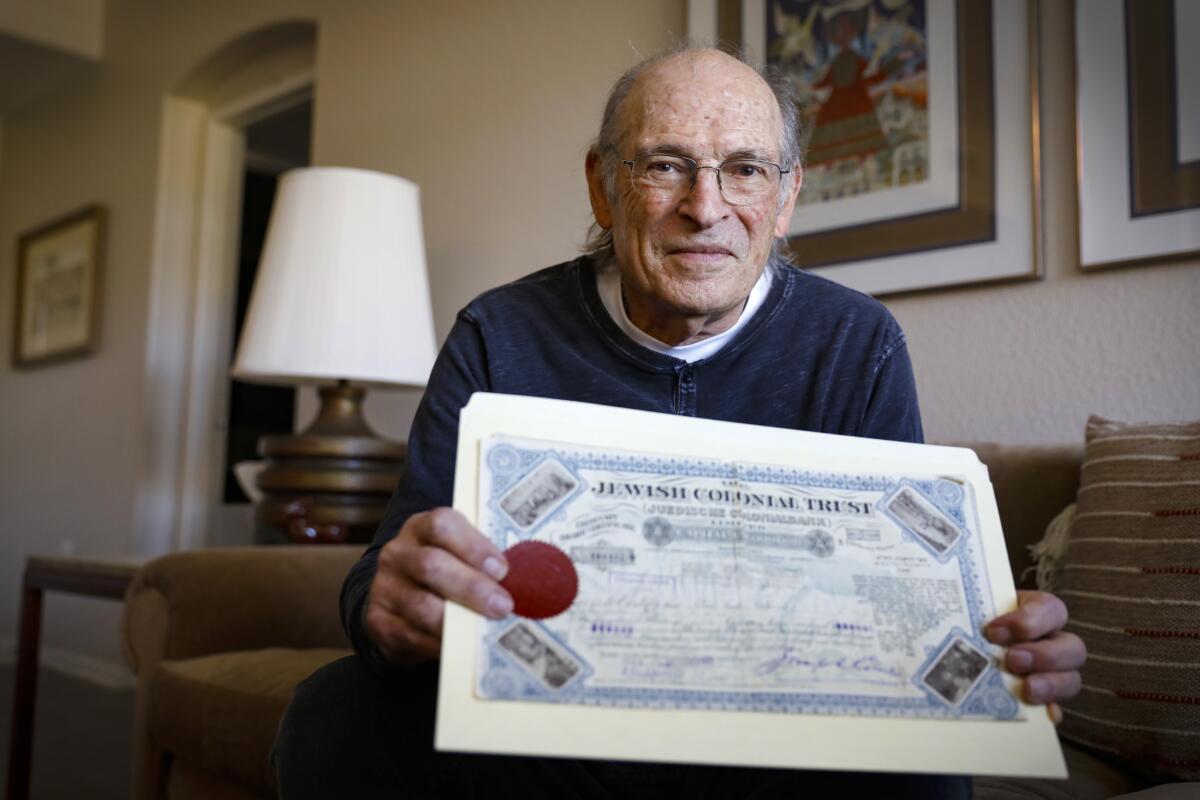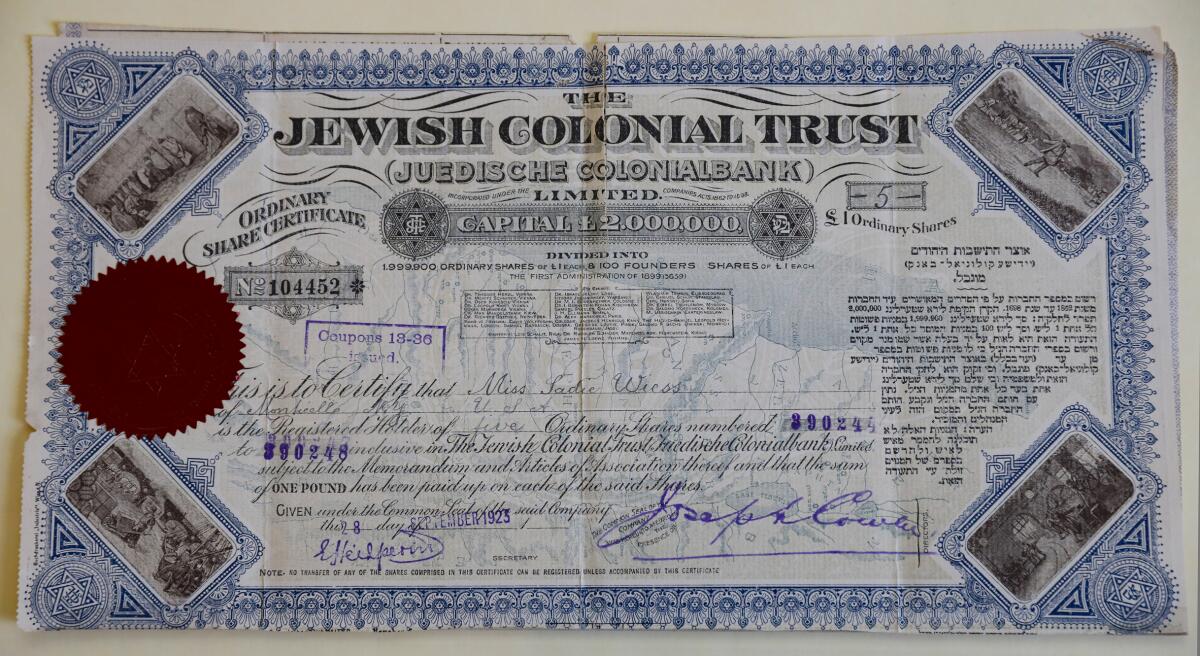Package unwraps 98-year-old mystery for San Diego Jewish family

- Share via
SAN DIEGO — Marty Weiss has no memory of his grandmother Sadie. Nor does the 85-year-old resident of San Diego’s San Carlos neighborhood remember anyone in his family ever visiting Israel or having a desire to move there.
But 98 years ago in New York, Jewish housewife Sadie Weiss made a significant investment in her family’s future. In September 1923, she bought five shares of stock in a bank created to fund the establishment of a Jewish homeland. Twenty-five years later, her dream was achieved when the state of Israel was created in the aftermath of the Holocaust. But by then, Sadie was gone, and the story of her shares died with her.
Marty Weiss discovered this hidden piece of family history late last month, when he got an email from a stranger in Canada who had purchased Sadie’s long-lost shares at a memorabilia auction and wanted to return them to the family.
Toronto attorney David Matlow, a collector of Zionist artifacts, spent three weeks searching online articles, obituaries, Facebook and a Weiss family memoir for Sadie’s descendants before finding Marty on LinkedIn. The certificate arrived Friday by mail.
“It was a big surprise,” Weiss said of learning about Sadie’s shares. “I didn’t know anything about her interest in this, and I don’t think any of my cousins did, either. It was totally out of the blue.”
It’s still possible to redeem Sadie’s shares — together, they’re worth about $250 — but Weiss said he plans to hold on to the certificate as a family keepsake. Although Sadie and her descendants never made it to Israel, her great-granddaughter — Marty’s daughter Andrea Weiss — became a rabbi, a vocation that wasn’t possible for women in Sadie’s lifetime.
Matlow received Sadie’s shares as part of a bundle of 55 certificates he bought at auction in December. They were meant for his Herzl Collection, which contains 5,000 pieces of memorabilia on pioneering Zionist leader Theodor Herzl and is billed as the world’s largest private collection of its kind. Born in 1860 in Hungary, Herzl was a journalist and opinion leader who advocated for the creation of a Jewish homeland in the Palestine region.
Concerned about anti-Semitism in Europe in the late 19th century, Herzl believed statehood was the only way to safely preserve the Jewish people and their cultural traditions. Between 1896 and his death eight years later in Vienna at age 44, Herzl wrote a book on creating a Jewish state, created a Zionist newspaper, launched a Zionist Congress of international Jewish leaders and established the Jewish Colonial Trust, which sold shares to fund the effort.
Herzl became such an enduring popular figure among Jews worldwide that his likeness was re-created on canvases, busts, coins, street signs, glassware, cutlery, ashtrays and salt and pepper shakers.
“He is the visionary, the founding father of the state of Israel who had this idea for a Jewish homeland,” Matlow said. “It has always been fascinating to me because it’s unique in world history that a people have returned to their ancestral homeland to reclaim a sovereign state. On May 13, 1948, there wasn’t a state of Israel, and on May 14, 1948, there was.”

Matlow, 60, said Herzl has always been a beloved figure in his family. His Canadian grandparents moved to Israel in 1955, and his now 93-year-old father flew there in 1948 to fight for the Israeli army in the Arab-Israel War.
A private equity and securities lawyer, Matlow has produced a documentary on Herzl, has visited Israel more than 50 times and is past chair of the Jewish Foundation of Greater Toronto. An admittedly obsessive collector since childhood (coins, stamps, Toronto Maple Leafs hockey jerseys), he started his Herzl collection in 1991, when he inherited the Herzl portrait that had hung in his grandparents’ home.
Over the years, Matlow has purchased many Jewish Colonial Trust shares for his collection. Most were issued in Europe between 1899 and 1901, and always to men. So Matlow was intrigued when he received Sadie’s shares in December.
Matlow recognized the town where she had bought them, Monticello, N.Y. Years ago, Matlow sent his daughter to summer camp in Monticello, a Catskills community that was famous in the mid-20th century for its Jewish vacation resorts.
Rather than keep Sadie’s shares, Matlow decided to find her family and pass the shares along so he could learn more about the woman and her dream.
“Something about that made me want to try to understand,” Matlow said. “Anyone who bought a share, it’s reflective of their commitment to the Zionist dream. This lady was trying to build her life and look after her children, and everything she did with her family there was partial to the idea of a Jewish homeland.”
According to an autobiography written by Marty Weiss’ father, Sam, Sadie Fleischer emigrated in the early 1900s from what is now Poland. She married Aaron Weiss, a Brooklyn tailor, and they had five children: four daughters and Sam. When the flu pandemic struck New York in 1918, the Weiss family left the city and settled in rural Monticello. Five years later, Sadie purchased her shares in the Jewish Colonial Trust.
Matlow estimates that in 1923, one share in the Jewish Colonial Trust cost about $5, the equivalent of about $76 today. Sadie’s $25 investment in five shares would have been a major outlay for the time, when a loaf of bread was 7 cents and a gallon of gasoline was 33 cents.
“Sadie and her husband were very poor,” Matlow said. “They lived in back of an apartment until they could buy a house. So to purchase five shares in that circumstance in 1923 was significant.”
In 1932, their son Sam, then 18, traveled to Brooklyn for a party and met his future wife, Blanche. They married two years later, and the first of their three children, Marty, was born in 1936 in Brooklyn. That same year, Sam and Blanche Weiss moved their small family to California before permanently settling in San Diego in 1940, where Sam worked at the company that became General Dynamics. After 81 years of marriage, Blanche died in 2014; Sam followed in 2019, at 105 years old.
Because Marty Weiss grew up in California, far from his grandparents, he never met or spoke with Sadie, who died when he was in grade school. His grandfather Aaron, who came to stay with the family in San Diego after she died, never spoke about shares she owned or her interest in creating or immigrating to a Jewish homeland. It wasn’t until Matlow emailed last month that Weiss learned about the Jewish Colonial Trust.
Now that he has the certificate, Weiss said he and his wife, Ruth, plan to make copies for relatives, and he will have it framed. Sadie’s story has become an exciting topic of conversation among the extended Weiss family.
“Now that I know about the Colonial Trust and Herzl, I’m going to pursue learning more about it,” Weiss said. “It has put me in contact with some of my cousins who I haven’t contacted in a long time. It’s been great.”
Kragen writes for the San Diego Union-Tribune.
More to Read
Sign up for Essential California
The most important California stories and recommendations in your inbox every morning.
You may occasionally receive promotional content from the Los Angeles Times.











